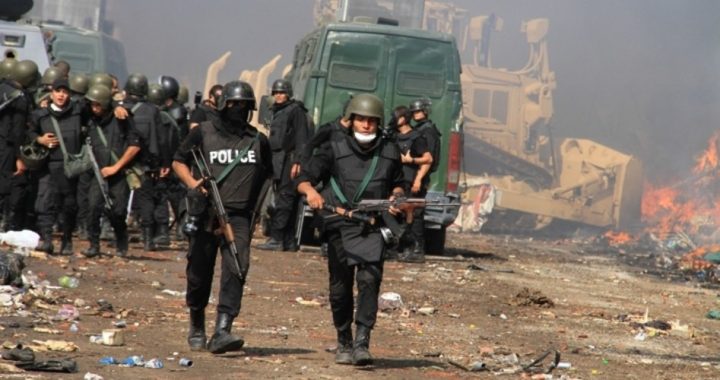
Egyptian government security forces conducted operations on August 14 to clear two camps in Cairo occupied by supporters of the ousted president, Mohamed Morsi, many of them followers of the Muslim Brotherhood. Government troops supported by armored vehicles moved into the camps, using tear gas to disperse crowds and bulldozers to level makeshift structures.
A report in the Los Angeles Times said that troops stormed pro-Morsi sit-ins at Cairo University and across the Nile outside the Rabaa al-Adawiya mosque.
The Times report said that the raids began shortly before 7 a.m. Cairo time, with the smaller protest at Cairo University being cleared first as Morsi supporters, many of them followers of his Muslim Brotherhood movement, reportedly escaped through trees and into a nearby zoo. Other protesters fought police as barricades were overrun and snipers peered down from high buildings.
The larger protest encampment at Rabaa offered more resistance to government forces. Thousands of Morsi’s supporters had been camped in that location over the last six weeks. Security forces set tents on fire and used bulldozers to clear barricades as helicopters buzzed overhead.
A security officer fired in the direction of a Times reporter who was surveying the scene near a dead protester’s body, and the reporter ran away from the tents to a safe location close to a nearby apartment building. The Times reported:
The military-backed government had threatened for weeks to storm the camps but had several times delayed operations over fears of widespread bloodshed, including deaths of women and children. But hard-liners in the government had pressed the military and the Interior Ministry to clear the sit-ins, which had been organized by the Brotherhood.
Reuters news reported that hours after the raids, Egypt’s interim president, Adly Mansour, declared a state of emergency, under which security forces may arrest and detain civilians indefinitely without charge.
The Washington Post reported a statement from Egypt’s Health Ministry that 60 people have died and 874 were wounded in violence nationwide, according to the state-run al-Ahram newspaper. Another report said that Hamdi Abdel Karim, an Egypt Health Ministry spokesman, told Reuters that 95 people were killed.
However, the Muslim Brotherhood’s Freedom and Justice Party put the death toll at more than 2,000 — a figure that could not be confirmed.
The Egyptian Foreign Ministry, reported the Post, said that the raids were conducted as “a last resort” after the government’s efforts to mediate a safe exit for protesters failed.
“After six long weeks of illegal, unauthorized sit-ins,” and after finding evidence of “torture” in the encampments, Egypt’s prosecutor general authorized security forces to break up the camps, Badr Abdelatty, a Foreign Ministry spokesman, said in a statement.
The Muslim Brotherhood issued a statement that the 17-year-old daughter of Mohamed el-Beltagi, an Egyptian Muslim Brotherhood politician, was killed as Egyptian police stormed the camp outside the the Rabaa al-Adawiya mosque.
Beltagi spoke on the Middle-East based al-Jazeera network within hours of his daughter’s death, predicting that the violence would turn Egypt into a new Syria. The security forces have lost their legitimacy, he claimed.
“Any soldier in the armed forces or police must take off his uniform” or be considered a “tool,” said Beltagi.
A Fox News report cited a statement made by one protester: “At 7 a.m. they came. Helicopters from the top and bulldozers from below. They smashed through our walls. Police and soldiers, they fired tear gas at children,” Saleh Abdulaziz, identified as a 39-year-old teacher, told Reuters. “They continued to fire at protesters even when we begged them to stop.”
Not surprisingly, reports of the ongoing violence differed according to which side was telling the story. As Fox News reported:
The pro-Morsi Anti-Coup alliance claimed that security forces used live ammunition in the raid, but the Interior Ministry, which is in charge of the police, said its forces only used tear gas and that they came under fire from protesters.
The Anti-Coup Alliance also said in a statement that 25 were killed at the Nasr City site, while the Muslim Brotherhood claims that 30 people had died there.
As we write, a report has just been released that Mohamed el-Baradei, Egypt’s interim vice president, has just resigned. Fox News reported that el-Baradei submitted his resignation in a letter to interim President Adly Mansour in which he cited “decisions I do not agree with” regarding the government’s crackdown on the protests that have continued since the ouster of former President Morsi.
“It has become difficult for me to continue bearing responsibility for decisions that I do not agree with and whose consequences I fear,” el-Baradei wrote. “I cannot bear the responsibility for one drop of blood.”
Mohamed Morsi was Egypt’s fifth president, and the first to be popularly elected. He served as president from June 30, 2012 until July 3, 2013. Objections to his usurpation of power led to protests against his government, starting on November 22, 2012. The protests peaked following the first anniversary of Morsi’s election, as millions of Egyptians flooded the streets of Cairo. On July 3, after a warning 48 hours earlier that they would intervene, the Egyptian armed issued a statement announcing the end of Morsi’s presidency. He was then declared unseated by a council consisting of defense minister Abdul Fatah al-Sisi, opposition leader Mohamed el-Baradei, the Grand Imam of al-Azhar, Ahmed el-Tayeb, and Coptic Pope Tawadros II.
Photo of Egyptian security forces in Cairo: AP Images



